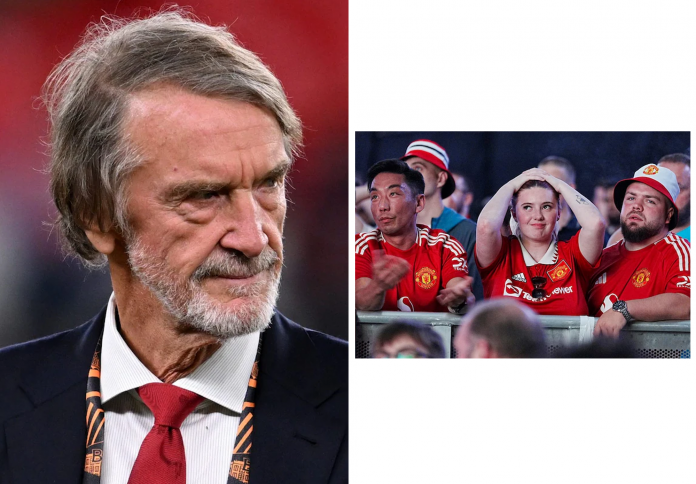In the wake of a painful Europa League final loss, Manchester United has announced a fresh wave of redundancies affecting football staff. The cost-cutting move comes amid deep unrest among employees and growing fan protests against the club’s ownership. As United braces for further turmoil, questions arise over the club’s future direction and stability.
A harsh blow for football staff
Manchester United’s ongoing financial overhaul intensified abruptly on Friday, as the club informed several football department employees that their roles were being terminated — less than 48 hours after the humiliating Europa League final defeat to Tottenham Hotspur.
This latest round of redundancies is part of an extensive effort to reduce costs under co-owner Sir Jim Ratcliffe’s strict regime. Last summer, approximately 250 jobs were cut; this time, up to 200 more positions across football and non-football sectors, including scouting, analytics, and sports medicine, are expected to be axed over the coming weeks.
At the Carrington training complex, several staff were called into brief 15-minute meetings where they received the distressing news. Some were visibly emotional, hurt not only by the losses but also by the timing — so soon after the season’s bitter finale. United had previously postponed decisions involving first-team personnel until after the competitive campaign, aiming to avoid distraction, yet the aftermath of the final left no room for delay.
Behind the scenes: Morale in free fall
The mood within the club is fragile, with uncertainty and frustration mounting daily. Staff had been warned since early May that sweeping cuts were imminent, fostering a climate of anxiety and apprehension. Those affected include key figures such as Steve Brown, the director of scouting; Richard Hawkins, director of football insights and innovations; and David Harrison, director of football operations.

Manchester United’s scouting department, once boasting a global network of 140 staff, has already seen significant shrinkage and faces further reductions from the current 80. The longest-serving club employee, Marie Marron — who has worked at United for nearly five decades — was also told she was at risk of redundancy. Marron’s role has been pivotal in team logistics and coordination with governing bodies like UEFA and the Premier League.
For many within the club, the past year has been a draining ordeal. Watching colleagues depart and living under the shadow of constant change has eroded morale. The distress was evident at a recent staff viewing of the Europa League final in Manchester, where boos erupted when Ratcliffe and fellow owner Avram Glazer appeared on screen, reflecting widespread employee dissatisfaction.
Fan unrest grows as protests loom
United’s turmoil is not confined to internal operations. Fans have been vocal in their criticism of the ownership, particularly over controversial plans to remove loyal supporters from seats near the pitch at Old Trafford to make way for more lucrative hospitality sections.

Supporters seated behind both dugouts in the lower south stand are among those set to be relocated next season. The move has sparked outrage, with fans publicly expressing their anger during recent matches and preparing protests for Sunday’s home game against Aston Villa.
Groups like the 1958 fan collective have organized a pre-match march from Sir Matt Busby Way to the stadium forecourt, aiming to draw attention to what they see as the erosion of club traditions and fan culture under current ownership.
One longtime supporter, 81-year-old Michael Carney, who has sat in the same seat since 1980, has become a prominent figure in the protests. At a recent 0-0 draw with Manchester City, Carney unfurled a sign questioning the value of decades of loyalty in light of recent events.
Former club legend Norman Whiteside and his wife Dee have announced they will not renew their season tickets after 28 years, citing frustration over seat relocations and what they perceive as a lack of player commitment. Whiteside, famous for scoring the winning goal in United’s 1985 FA Cup final, lamented the club’s current state of affairs and declining connection to fans.
Wider implications for the club’s future
Financially, Manchester United faces a precarious situation. The club has posted losses totaling £313 million over the past three years, with the latest quarterly reports forecasting another £40 million deficit this season. The failure to qualify for the Champions League and poor Premier League performances are expected to cost United more than £150 million in combined prize money, broadcast revenue, gate receipts, and penalty fees.United could finish as low as 17th in the league if results go against them in the final matches, a position not seen since their relegation 51 years ago — a stark reminder of the club’s fall from grace.
Co-owner Sir Jim Ratcliffe has defended the drastic cost-cutting measures, claiming the club “would have gone bust by Christmas” without them. Yet for fans and employees alike, the pain of the cuts and the ongoing turmoil raises profound questions about the club’s direction and ambition.
Voices of concern from within and beyond
Former United captain and pundit Gary Neville has been among the most outspoken critics. He condemned the club’s willingness to sell top academy prospects such as Scott McTominay and possibly Marcus Rashford, framing it as “ripping the heart out of the academy” to fund ownership mistakes.
Neville also urged current manager Ruben Amorim to stop taking blame and focus on solutions, warning against self-sacrifice amid the club’s broader failings. “Now is not the time for him to offer himself up,” Neville said. Amid all this, the tension between ownership, staff, and fans continues to simmer — a precarious balance that will define Manchester United’s immediate future as the club seeks to rebuild from a season of unprecedented challenges.










